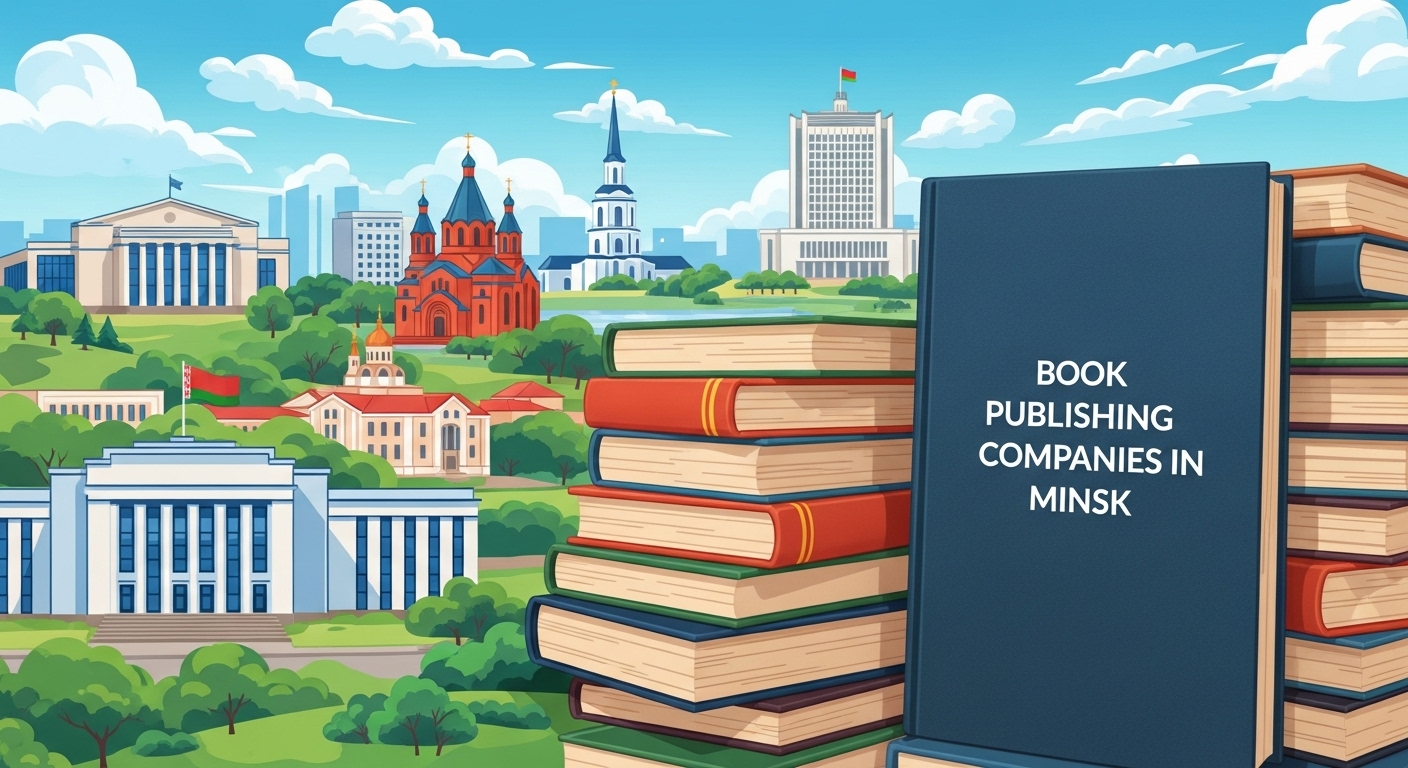
Belarus’s capital, Minsk, continues to strengthen its cultural and literary profile. Over the past decade the city has seen a steady growth of small and mid-sized publishers that serve local authors, translators, academic presses, and niche-interest readers. Whether you’re an emerging Belarusian novelist, an academic wanting a regional press, or an international author seeking a Belarus-focused publisher, Minsk offers an interesting mix of traditional houses, boutique imprints, and hybrid services that combine editorial care with flexible publishing and distribution options.
1. Barnett Ghostwriting
Barnett Ghostwriting operates in Minsk as a hybrid service that combines bespoke writing and ghostwriting with publishing and editorial production. The firm is known for helping authors take a manuscript from concept to finished book, offering writing, editing, proofreading, and publishing support.
What makes it unique
Barnett’s strength lies in project management and author collaboration: authors who need hands-on help turning concepts into publishable manuscripts will find an end-to-end service model rather than a traditional acquisitions process. This makes Barnett a useful option for subject-matter experts and professionals who want a polished final product without negotiating the conventional submission pipeline.
2. Vesna Press
Vesna Press is a well-established Minsk imprint focused on contemporary Belarusian literature and quality literary translations. They publish novels, short-story collections, and poetry, and they have a modest but consistent backlist of important local voices.
What makes it unique
Vesna has a reputation for editorial attention to language and literary style. Their lists often highlight emerging Belarusian authors and carefully chosen translations that introduce global writers to local readers.
3. Central Belarus Academic Press
Central Belarus Academic Press (CBAP) serves the academic and educational market with textbooks, scholarly monographs, and conference proceedings. It partners with universities and research institutes across Belarus.
What makes it unique
CBAP’s relationship with the academic community ensures that its editorial process is grounded in peer review and scholarly standards, making it the go-to choice for academics seeking formal publication in Belarusian and Russian.
4. Dnieper Books
Dnieper Books is a small independent publisher focused on regional history, cultural studies, and illustrated non-fiction. Their books frequently include archival photos and local scholarship.
What makes it unique
Dnieper Books specializes in high-quality production values—heavy stock paper, thoughtful design, and carefully curated photographic content—serving readers who want tactile, richly produced books about place and identity.
5. Novaya Linia Publishers
Novaya Linia (New Line) publishes contemporary commercial fiction alongside a select list of lifestyle and leisure titles. They maintain active relationships with book retailers and organize author events in Minsk.
What makes it unique
Novaya Linia combines commercial instincts with local market knowledge, which helps authors who prioritize discoverability and bookstore presence over purely literary ambitions.
6. Red Maple Children’s Books
Red Maple is a niche publisher concentrated on children’s and young-adult literature—picture books, illustrated fiction, and educational resources for younger readers.
What makes it unique
Red Maple invests in illustration and design and collaborates closely with illustrators, making it a strong partner for creatives producing visually driven children’s titles.
7. Minsk Modern Editions
Minsk Modern Editions is a boutique publisher committed to contemporary experimental literature, art books, and limited-edition projects. They often work with artists and poets to create hybrid art/book objects.
What makes it unique
Their emphasis on the book as an art object—beyond the purely literary—attracts authors and visual artists exploring form, materiality, and interdisciplinary work.
8. BelLit International
BelLit International operates as a bridge between Belarusian authors and foreign readerships. The press focuses on translation projects and bilingual editions while also supporting Belarusian writers with international translation rights services.
What makes it unique
BelLit International’s network and focus on translation make it a logical partner for authors who want exposure beyond the Belarusian market or who are seeking bilingual publication formats.
9. Horizon Technical Publishing
Horizon serves the specialist market—engineering, applied sciences, IT, and technical manuals. Their editorial processes emphasize technical accuracy, peer review, and up-to-date content.
What makes it unique
Horizon’s editorial teams include subject-matter experts who ensure that technical content is both accurate and usable by practitioners, which is crucial for textbooks and reference works.
10. Golden Leaf Press
Golden Leaf Press is a commercial independent with a broad list that ranges from memoirs and popular nonfiction to translated contemporary fiction. They are active in bookstores and have a modest digital publishing arm.
What makes it unique
Golden Leaf balances literary sensibilities with awareness of market trends, making it a pragmatic option for authors seeking professional editing and reasonably strong retail placement within Belarus.
Submission tips for authors
- Format your manuscript clearly: include a short one-page synopsis, an author bio, and sample chapters (usually the first three chapters or 50 pages).
- Research each publisher’s editorial focus before submitting; targeting increases the chance your manuscript will be read.
- For translated projects or bilingual editions, include information about translation rights and previous publication history of the original text.
- For academic and technical work, include institutional affiliations and peer-review endorsements if available.
Production and timelines
- Small and mid-size Minsk publishers commonly take 3–9 months from acceptance to publication for trade fiction and non-fiction; illustrated or technical books may take longer depending on design, permissions, and peer review.
- Print runs vary widely: boutique and art presses may do limited numbered editions of a few hundred copies, while commercial houses plan larger runs according to anticipated retail demand.
- Increasingly, authors are offered hybrid or co-publishing models where costs and revenues are shared; read contracts carefully.
Rights, translations, and distribution
- Negotiate clear terms for translation rights and international distribution if you anticipate foreign-language editions.
- Many Minsk publishers maintain relationships with regional distributors in Belarus and neighboring countries; global distribution usually requires separate agreements with foreign publishers or international distributors.
- Digital editions are common but check royalty rates and distribution territories.
Working with editors and designers
- Expect substantive editing in houses focused on literary quality and developmental editing for first-time authors.
- For illustrated children’s books or art books, publishers commonly commission illustrators or accept author-supplied artwork under clear licensing terms.
Choosing the right publisher
- Is your book literary, academic, technical, or commercial? Match the genre to the imprint.
- Do you need translation or bilingual formats? Prioritize publishers experienced in translations.
- Are production values (photography, illustration) essential? Choose a house with demonstrated design quality.
- What timeline and distribution do you need? Confirm print-run expectations and distribution reach before signing.
Conclusion
Minsk’s publishing scene in 2025 offers a diverse set of options for writers and readers—from boutique art-book makers and experimental presses to academic houses and commercially minded publishers. Whether you are an author seeking a traditional editorial relationship, an academic needing peer-reviewed publication, or a creative professional producing a highly visual book, Minsk provides specialized publishers to suit different needs. Carefully target submissions, clarify rights and timelines up front, and choose a partner whose editorial priorities match your project’s aims—doing so will increase the likelihood of a successful and well-produced book.





